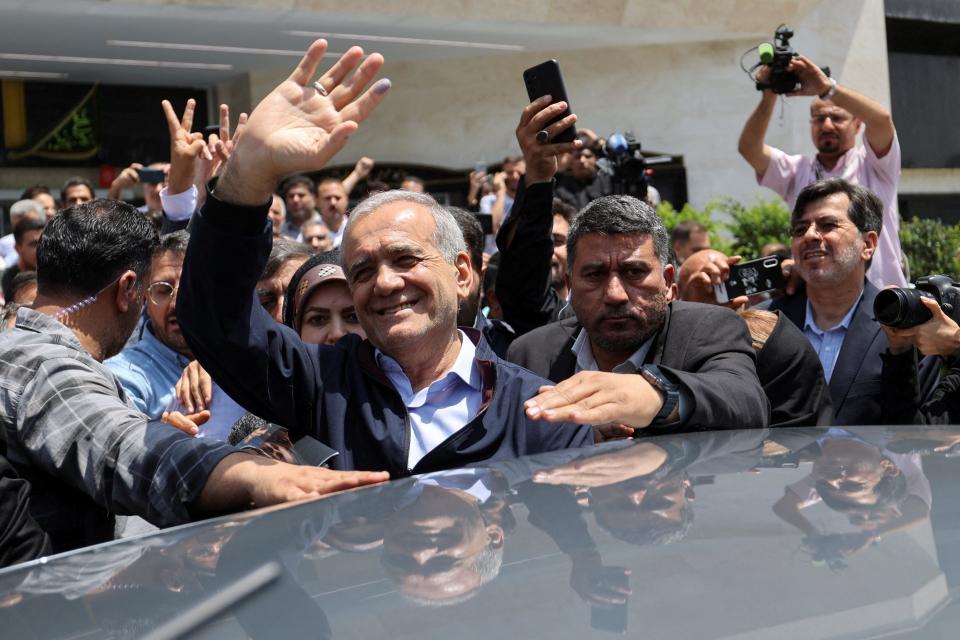Who won Iran election? Country moves into runoff between hawk and heart surgeon

An ultraconservative, anti-Western hawk who routinely lectured U.S. officials during nuclear negotiations. Or a low-key lawmaker and heart surgeon who's signaled he favors a less hostile foreign policy and easing some of Iran's social restrictions.
Those are the two choices facing Iran's voters in an election Friday to determine the country's next president.
Former nuclear negotiator Saeed Jalili and moderate Masoud Pezeshkian were competing in a run-off after no candidate in an original field of four secured more than 50% of the vote on June 28.
Preliminary results from Iran's interior ministry could come as early as Saturday.
Is Iran's vote fair? Why is it happening now?
Iran's elections, and who can run in them, are tightly controlled.
The Islamic Republic's Supreme Leader Ali Khamenei − not the president − wields the most power over all domestic and foreign affairs, though the president does have influence and can help set the country's tone and overall direction.
The snap election, called after conservative President Ebrahim Raisi died in a helicopter crash in May, comes amid deep voter apathy. Only 40% of Iran's 60 million eligible voters, a record low, participated in the first round ballot, according to the state news agency IRNA. Pezeshkian won about 43%, Jalili took 39%.
Many Iranians doubt that their ballot-box choices will lead to meaningful change. Economic woes, hijab crackdowns, Internet restrictions, mismanagement and corruption are the main reasons the vote has been boycotted, according to the Stimson Center, a Washington think tank.
"I know my vote won't matter. Whatever happens, they will continue to enforce anti-women, Islamic laws," Shakiba, 26, a Tehran-based content creator, previously told USA TODAY, speaking about Iran's clerical regime. Fearing retribution, she only agreed to be interviewed if her last name wasn't used.
Hijab crackdown: Iran presidential candidates are ducking the issue. What does that mean for women?
Who is Saeed Jalili?
Jalili, 58, is a rigid ideologue.
He was known as a hard-headed diplomatic opponent of the U.S. while serving as Iran's chief nuclear negotiator at talks in Geneva.
During the presidential campaign, Jalili vowed to find ways to overcome Western sanctions on Iran. He also wants Iran to have stronger ties to China and Russia. Jalili lost his right leg fighting in Iran's war with Iraq in the 1980s. He unsuccessfully ran in the 2013 presidential election. He ran again in 2021, but withdrew.
Who is Masoud Pezeshkian?
Pezeshkian, 69, a mild-mannered surgeon and former health minister, has criticized the government's handling of dissent, including its harsh enforcement of a mandatory dress code for women − though cautiously and rarely directly. Pezeshkian supported the 2015 nuclear deal between Iran and world powers that former President Donald Trump withdrew the U.S. from.
He is pragmatic and reform-minded. But Pezeshkian is also seen as loyal to Khamenei and is not viewed as a political threat. He, too, previously ran for president, in 2013 and 2021, but failed to secure to many votes.
The Stimson Center said Jalili and Pezeshkian "represent opposite poles of permitted activity" in Iran.
Iran's election in Iran is here: What to know about candidates
Why does Iran's vote matter?
Elections in Iran fall short of democratic standards in the West. The choices voters have are circumscribed by Iran's unelected clerical leaders and institutions.
"Elections in Iran have long been used to legitimize the power and influence of the ruling elite," wrote Sanam Vakil, an expert on Iran at Chatham House, a London think tank, in a recent report.

After Raisi's death, Iran also wants to show the world that it can calmly and decisively handle the sudden death of a president at a time when tensions remain high with Israel, its economy is suffering from U.S. sanctions and protesters continue to defy social modesty laws.
Khamenei is 85. This means the next president will be closely involved in selecting Iran's next supreme leader.
This article originally appeared on USA TODAY: After Iran election results yield no clear winner, a runoff looms


